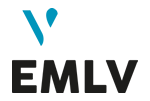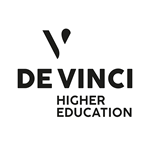An article by professor researcher Kseniya Navazhylava of EMLV Paris, in coauthorship with the ex-MSC IB student Meruyert Ibraimova has been recently published in a reputable scientific journal.
Against the backdrop of claims advanced in the media that Gen Z are notoriously hard to work with, a recent collaboration of an EMLV professor with her ex-student provides a hopeful contrast. The article, resulting from over two years of hard work by both coauthors, was published at the end of 2024 in The International Journal of Human Resource Management and ranks three stars out of four in the ABS list of reputable scientific production.
The transition between HR practices regarding traditional and remote work during the COVID-19 pandemic
The publication’s journey began in September 2022, when Meruyert Ibraimova defended her Master’s Thesis under the guidance of Professor Kseniya Navazhylava. During the defense, Professor Navazhylava identified a missing perspective in Ibraimova’s research: the transition between HR practices regarding traditional and remote work during the COVID-19 pandemic. Following an insightful discussion, she encouraged Ibraimova to explore this angle further so that she could publish it in a scientific journal.
Reflecting on the moment, Professor Navazhylava admired Ibraimova’s independent thinking and strong work ethic. She encouraged her former student, emphasizing that publishing could be valuable if she pursued doctoral studies or sought career opportunities in a different country or field. Ibraimova accepted the challenge, marking the beginning of their collaboration.
Navigating Collaboration and Academic Debate
At the time of the collaboration, Ibraimova was no longer a student and had secured her first full-time job. The decision to co-author a publication with a former student sparked discussions on academic ethics and authorship within the university community.
Debates surrounding student-professor collaborations often highlight concerns about power imbalances, authorship fairness, and the extent of a professor’s contribution to a paper. Some argue that only students who significantly contribute to a study should be listed as co-authors, while others stress the need for transparency in defining contributions.
Beginning the project after graduation helped mitigate concerns about Ibraimova and Navazhylava’s hierarchy. However, they recognized the importance of establishing clear guidelines regarding workload distribution, authorship order, and research confidentiality. Ibraimova, aware of the time constraints posed by her new job, acknowledged that she would have to dedicate weekends to the project.
Understanding the importance of well-being, Professor Navazhylava took on the responsibility of repositioning the research within new academic literature, reanalyzing the collected data, and developing a theoretical framework. Ibraimova later returned to the organization under study to conduct second-round interviews, while Navazhylava focused on additional analysis and writing. Based on their respective contributions, they agreed that Ibraimova would be listed as the second author of the publication.
Publication Success and Research Implications
Following revisions based on reviewer feedback, their paper was accepted for publication in the International Journal of Human Resource Management (IJHRM) after two years. Both co-authors were thrilled by the prospect of seeing their names in the journal. Ibraimova expressed gratitude for Navazhylava’s mentorship and support throughout the research process, recognizing the value of their collaboration.
Professor Navazhylava emphasized the importance of demonstrating to students that rigorous and independent work can yield professional rewards. She highlighted that fostering autonomy in young researchers allows them to develop their own academic voice, a crucial skill for career advancement. The research experience, she noted, showcases essential qualities such as intelligence, expertise, autonomy, resilience, and time management, which employers highly value.
The published article addresses empowerment in HR practices, distinguishing it from responsibilization. In this phenomenon, difficult decisions are delegated to frontline employees, who ultimately bear the consequences, including legal liabilities. The study explores how legal uncertainties influence HR practices, providing critical insights into workplace decision-making and organizational structures.





















